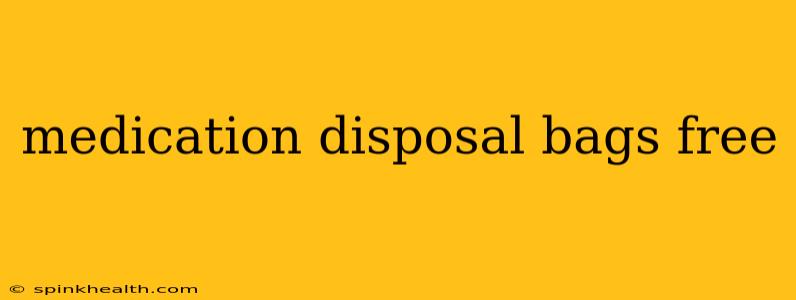Have you ever wondered what to do with leftover medication? Simply tossing pills in the trash isn't safe for the environment or your family. Thankfully, there are safe and often free options for disposing of unwanted medications. This guide will walk you through finding free medication disposal bags and other safe disposal methods. It's a story about responsible medication management, and how a simple bag can make a big difference.
Where Can I Find Free Medication Disposal Bags?
This is often the first question people ask. The availability of free medication disposal bags varies significantly depending on your location. Let's explore some common avenues:
-
Your Local Pharmacy: Many pharmacies, especially larger chains, participate in drug take-back programs. These programs often provide free medication disposal bags or containers. Call your local pharmacy and inquire – it's the easiest first step! Don't be afraid to ask; they're often happy to help.
-
Your Doctor's Office: Similar to pharmacies, some doctor's offices also participate in medication disposal programs and might offer free disposal bags or direct you to a local collection point.
-
Local Law Enforcement Agencies: Many police departments and sheriff's offices hold periodic drug take-back events. These events often offer free disposal bags and on-site disposal. Check your local police department's website or call them for upcoming events. This often involves a community drive and is a great way to safely dispose of a larger amount of medication.
-
Local Health Departments: Your local health department is another excellent resource. They can often provide information about medication disposal programs in your area, including locations offering free disposal bags.
What About Mail-Back Programs for Medications?
Some pharmaceutical companies offer mail-back programs for specific medications. These programs typically provide pre-paid envelopes and packaging for safe disposal. While not always free disposal bags in the traditional sense, they offer a convenient and secure method, especially for controlled substances. Check the manufacturer's website for the medication in question to see if a mail-back option is available.
Are There Other Safe Medication Disposal Methods Besides Bags?
Yes, while medication disposal bags are convenient, other safe methods exist:
-
Medication Take-Back Events: As mentioned earlier, these events provide an opportunity to safely dispose of medications in person.
-
Flushing Medications Down the Toilet: This used to be a common recommendation, but it's generally discouraged now except for specific medications listed by the FDA. Improper flushing can contaminate water supplies. Always check the FDA website or your medication's label for guidance.
How Do I Use a Medication Disposal Bag Safely?
Even with a free medication disposal bag, proper usage is crucial. Most bags contain activated carbon, absorbing the medication and rendering it inert. Never puncture or tear the bag. Follow the instructions provided with the bag carefully. After filling the bag, securely seal it according to the instructions, often involving multiple layers of closure.
What Should I Do If I Don't Have Access to Free Disposal Bags?
If you can't find free medication disposal bags locally, consider contacting your local health department or a pharmacist for advice. They may be able to direct you to alternative disposal methods or resources. Don't resort to unsafe practices like throwing medications in the trash.
Why is Proper Medication Disposal Important?
Improper disposal of medications poses significant risks:
-
Environmental Contamination: Medications entering waterways can harm aquatic life.
-
Accidental Ingestion: Children and pets can accidentally ingest medications found in the trash.
-
Diversion for Abuse: Improperly disposed medications can fall into the wrong hands.
By utilizing free medication disposal bags or other safe disposal methods, you contribute to a healthier environment and safer community. Remember, responsible medication management is a shared responsibility. A simple act of safe disposal makes a world of difference.

